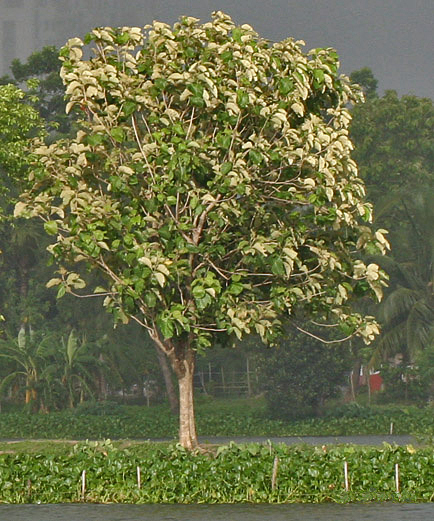- The Dutch Food and Safety Authority has ruled Dutch company Boogaerdt Hout in violation of the EU Timber Regulation (EUTR) for placing illegal Burmese teak on the EU market. The company has two months in which to clear its supply chain of illegal wood.
- The EUTR is part of the EU’s Forest Law Enforcement Governance and Trade (FLEGT) action plan and aims to reduce illegal logging by banning the sale of illicitly sourced timber and timber products in the EU.
- While most teak on the market today comes from plantations, some is still illegally sourced from Myanmar.
- The extraction of Burmese teak has been denounced by conservationists, who say its trade is helping fuel rampant illegal logging in the country.
An investigation has revealed a major Dutch timber company placed illegally sourced teak from Myanmar on the European market, prompting the Dutch Food and Safety Authority to rule the company in breach of the EU Timber Regulation (EUTR).
A second company, not yet named, was also found guilty of violating EUTR requirements.
Under the EUTR, companies must conduct due diligence to ensure they don’t allow illegally sourced timber into their supply chains and onto the market. The Dutch Food and Safety Authority found Boogaerdt Hout violated these due diligence requirements when bringing Burmese teak into the European market.
The Dutch government has given Boogaerdt Houta two months in which to clear its supply chain of Burmese teak. If after that time the company has still not complied, it will be fined 20,000 euros ($23,000) per cubic meter of illegal timber.
Teak (Tectona grandis) is native to South and Southeast Asia, and its wood is prized for use in high-end furniture and boats. While most teak on the market today comes from plantations, some is still illegally sourced from Myanmar. The extraction of this Burmese teak has been denounced by conservationists, who say its trade is helping fuel rampant illegal logging in the country.

The investigation that provided evidence toward the ruling against Boogaerdt Hout was conducted by the Environmental Investigation Agency (EIA), a London-based organization. According to the EIA, Boogaerdt Hout joins the ranks of at least 17 companies that have been found guilty of violating EUTR requirements by trading in Burmese teak. Boogaerdt Hout did not respond to requests for comment.
The EUTR is part of the EU’s Forest Law Enforcement Governance and Trade (FLEGT) action plan and aims to reduce illegal logging by banning the sale of illicitly sourced timber and timber products in the EU. But while the EUTR is applied EU-wide, member countries are responsible for defining what timber is and isn’t legal. With this ruling, the Netherlands joins Germany, Belgium, Sweden, Denmark and the U.K. in defining teak imported from Myanmar as an illegal wood.

However, the status of Burmese teak in Italy and Spain remains in limbo.
“Myanmar’s forests are in crisis, with a timber industry that has long been plagued by corruption and overharvesting,” said Faith Doherty, head of EIA’s Forests Campaign. “Two EU member states, Italy and Spain, are dragging their feet on enforcement and continue to allow clearly non-compliant timber to enter their markets. This is undermining support for reform in Myanmar and providing an uneven playing field for companies in EU countries that are enforcing the law.”
The EIA commended the Myanmar Forest Department for gains made in recent years, including enacting national and regional logging bans, as well as new timber laws. However, the organization says more needs to be done to reform the country’s timber industry and reduce illegal logging, specifically calling for greater transparency. This, the NGO says, would go a long way toward independent monitoring and assurance that any teak entering the EU market did not come from a Myanmar rainforest.
FEEDBACK: Use this form to send a message to the editor of this post. If you want to post a public comment, you can do that at the bottom of the page.
